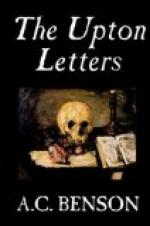I do not know if you ever came across a book—I must send it you if you have not seen it—which moves me and feeds my spirit more than almost any book I know—the Letters and Journals of William Cory. He was a master at Eton, you know, but before our time; and his life was rather a disappointed one; but he had that remarkable union of qualities which I think is very rare—hard intellectual force with passionate tenderness. I suppose that, as far as mental ability went, he was one of the very foremost men of his day. He had a faultless memory, great clearness and vigour of thought, and perfect lucidity of expression. But he valued these gifts very little in comparison with feeling, which was his real life. It always interests me deeply to find that he had the same opinion of Charlotte Bronte that I hold; and indeed I have always thought that, allowing for a difference of nationality, he was very much the kind of man whom she depicted in Villette as Paul Emmanuel.
Personality is, after all, the ultimate foundation of art, and I think that what I value most of all in Charlotte Bronte’s books is the revelation of herself that they afford. The shy, frail, indomitable, ardent creature, inured to poverty and hardness, without illusions, without material temptations, but all aglow with the sacred fire—such is the character that here emerges. Charlotte Bronte as a writer seems to me like a burning-glass which concentrates on one intense point the fiercest fire of the soul. I would humbly believe that there is much of this spirit in the world, but that it seldom co-exists with the artistic power, the intellectual force, that enables it to express itself.
And now I will tell you what has made me take up Jane Eyre again at this time. I was bicycling a day or two ago in a secluded valley under the purple heights of Ingleboro’. I passed a little village, with a big building standing by a stream below the road, called Lowood. It came into my head as a pleasant thought that some place like this might have been the scene of the schooldays of Jane Eyre; but I thought no more of it, till a little while after I saw a tablet in the wall of a house by the wayside. I dismounted, and behold! it was the very place, the very building where Charlotte Bronte spent her schooldays. It was a low, humble building, now divided into cottages. But you can still see the windows of the dormitory, the little kitchen garden, the brawling stream, the path across the meadows, and, beyond all, the long line of the moor. In a house just opposite was a portrait of Mr. Brocklehurst himself (his real name was Carus-Wilson), so sternly, and I expect unjustly, gibbetted in the book. That was a very sacred hour for me. I thought of Miss Temple and Helen Burns; I thought of the cold, the privation, the rigour of that comfortless place. But I felt that it was good to be there. I drew nearer in that hour to the unquenched spirit that battled so gloriously with life and with its worst terrors and sorrows, and that wrote so firmly and truly its pure hopes and immortal dreams. . . .—Ever yours,




